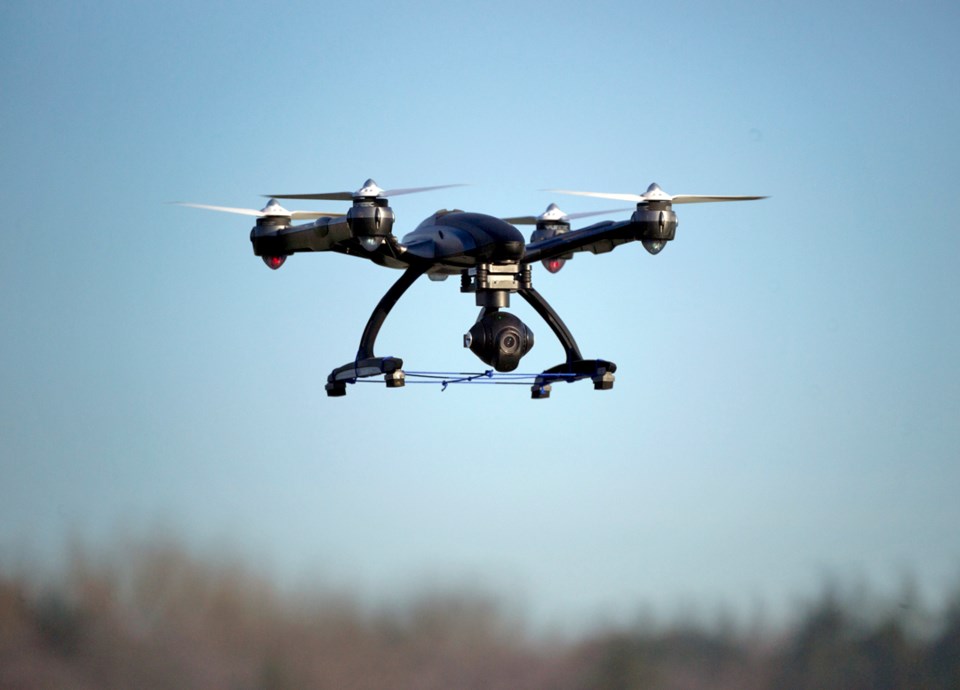A Burnaby anti-drone technology company has been ordered to pay $800,000 to a Â鶹´«Ã½Ó³»anti-drone technology company for stealing its confidential source code.
Vancouver-based Skycope Technologies said it spent $1,654,480 developing wireless technology that enables users to detect and jam unwanted drones, according to .
Applications for the technology could include protecting personal privacy, keeping drones out of air traffic lanes and preventing them from being .
In August 2018, Skycope launched a lawsuit against Burnaby-based Bluvec Technologies Inc. for stealing its trade secrets through former Skycope employees.
Wrongdoing led to ‘competitive advantage’
After 10 days of trial between August 2021 and February 2023, B.C. Supreme Court Justice Nitya Iyer released her ruling in the case on July 27.
Citing expert evidence, Iyer concluded Bluvec had used Skycope’s confidential code and gotten a nine-month head start on its anti-drone technology, wiping out Skycope’s “competitive advantage.”
But the only evidence Bluvec gained financially through its wrongdoing, according to Iyer, is that it used Skycope’s direction-finding code (technology Skycope developed to identify the location of a drone and what direction it came from) to make its own direction-finding function, which it sold to a Chinese company for $800,000.
Iyer awarded that amount to Skycope in damages.
Skycope said it had incurred nearly $10.3 million in losses because of Bluvec’s actions, but Iyer said the company didn’t provide sufficient evidence to support those claims.
“I agree with the defendants that there is no evidence that Skycope suffered any financial loss at all,” Iyer said.
‘Close friendship’
Behind the lawsuit, according to Iyer, was a “close friendship” that had fallen apart.
Zhenhua “Eric” Liu, the head of Skycope, and Junfeng “Jack” Jia, the head of Bluvec, had once been friends working for cyber security giant Fortinet in Beijing.
Both came to Canada to work in that company’s Â鶹´«Ã½Ó³»office, and both were founders of Skycope.
Liu left paid employment first, in early 2016, to work on the start-up.
Jia came onboard closer to the end of the year, in October 2016, as the company’s chief technology officer.
Things went south just over a year later when Liu fired Jia without notice in Dec. 13, 2017.
“(Jia) described Mr. Liu as having ambushed him and stabbed him in the back,” Iyer said.
Bluvec was launched three month later, according to the ruling.
Within a couple of months, five former Skycope employees named in the lawsuit had left Skycope and joined Bluvec.
At trial, Jia repeatedly insisted Bluvec’s business was about much more than wireless anti-drone technology, but an affidavit he swore in October 2018 stated the development and marketing of anti-drone technology was Bluvec’s “sole project” at the time.
Private investigator hired
After Skycope found out about Bluvec in June 2018, it hired a private investigator who rented space at Bluvec’s office building at 3999 Henning Dr. to find out whether the new company was designing and marketing anti-drone technology using Skycope technology.
A member of the investigator’s team posed as a prospective client, saying his company was having drone problems at its cannabis warehouse.
The “client” was given a PowerPoint presentation, a brochure describing Bluvec’s product, and demonstration at Vancouver’s Adanac Park in August 2018.
It showed how the product could detect a DJI Phantom 4 drone, take control of it and cause it to land.
Injunction breached
Skycope launched its lawsuit and won an injunction in October 2018 prohibiting Bluvec from competing in the anti-drone industry for two months and developing any anti-drone source code or software based on SkyCope’s source code pending a trial.
Jia, Bluvec and Leyuan “Michael” Pan, an ex-Skycope employee who joined Bluvec, would go on to breach that injunction, according to Iyer's ruling.
Skycope had asked for a permanent injunction against Bluvec, but Iyer ruled a permanent injunction wasn’t warranted because there was no evidence the advantage the company had gained by misusing the confidential information has continued.
She also declined to award punitive damages against Bluvec, Jia and Pan.
But she did find Jia and Pan had breached their employment agreements with Skycope, which included confidentiality and non-compete clauses, and ordered Pan to pay Skycope’s legal fees in his case.
30 per cent share
Skycope didn’t come away unscathed.
Jia had launched a counterclaim for wrongful dismissal; the return of a $10,167.06 loan; $100,000 in overtime and unpaid work; and a 30 per cent ownership share in Skycope, which he said he was promised in an oral agreement before he joined the company.
At trial, Liu insisted Jia was not a founder of Skycope, but the company’s own lawsuit stated Jia was a founder, and Liu himself had listed Jia as a shareholder in an email presented in court.
Iyer ordered Skycope to pay Jia $12,475 for the return of the loan and two weeks’ pay in lieu of notice for his termination.
She also ordered Skycope to pay Jia damages equal to a 30 per cent equity interest in Skycope as of the date he was fired.
‘Enmity’
The ruling is unlikely to heal the wounds between the former friends.
Iyer said their “enmity” was evident during the trial.
“What was a close friendship has turned into deep animosity, with each side seemingly committed to driving the other out of business,” she said.
Their animosity impacted their testimony, according to Iyer, who concluded neither was a credible witness in the case.
She didn’t rely on Pan’s testimony either, which she described as “combative,” “long-winded and evasive.”
Follow Cornelia Naylor on Twitter
Email [email protected]


